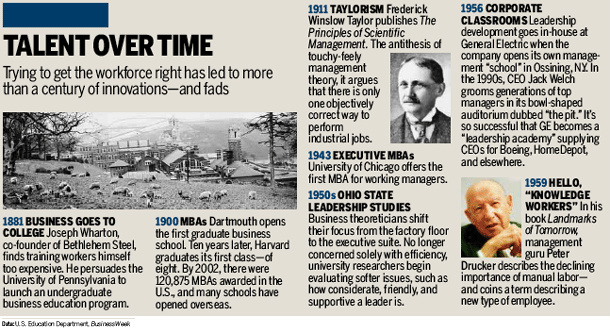Business Week 에서는 21세기 들어 격화되고 있는 인재 전쟁에 대한 특집을 마련하고 어떻게 최고의 인재들을 채용하고 교육하고 유지할 것인가에 대한 심층 취재를 통해 새로운 형태의 경쟁력 강화에 대한 해법을 제시하고 있습니다.
이에 대한 분석 중 Business School 의 역사와 변화과정들을 정리했습니다.
우리가 막연하게 비지니스 분야 리더를 길러낸다는 MBA 프로그램에 대해 알고있지만, 사실은 100 년 전부터 사회의 필요에 의해 그리고 상당히 강한 철학적 배경 하에 비지니스 리더를 길러왔으며 계속 진화해가는 모습을 보여주고 있습니다.
리더는 하루 아침에 만들어 지는 것은 아니며, 그 사회의 물적, 인적, 문화적 인프라와 처해진 상황에 따라 길러진다는 것을 이해해야만 최고의 인재들을 길러낼 수 있을겁니다.
Cover Strory - Star Search; How to recruit, train, and hold on to great people. What works, what doesn't (by Nanette Byrnes, Business Week, Oct. 10, 2005)
Talent over Time (비지니스 인재 교육의 변천사)
1881 Business Goes to College (대학에서 비지니스를 가르치기 시작하다)
Joseph Wharton, co-founder of Bethlehem Steel, finds training workers himself too expensive. He persuades the University of Pennsylvania to launch an undergraduate business education program
1900 MBAs Dartmouth (다트머스에서 MBA 프로그램 시작되다)
opens the first gradaute business school. Ten years later, Harvard graduates its first class-of eight. By 2002, there were 120,875 MBAs awarded in the U.S., and many schools have opened overseas.
1911 Taylorism (테일러리즘: 과학적 경영의 원리)
Frederick Winslow Taylor publishes "The Principles of Scientific Management". The antithesis of touchy-feely management theory, it argues that there is only one objectively correct way to perform industrial jobs.
1943 Executive MBAs (Executive MBA 프로그램이 시카고 경영대학원에서 시작되다)
University of Chicago offers the first MBA for working managers.
1950s Ohio State Leadership Studies (오하이오 주립대에서 비지니스 리더쉽에 대한 연구조사를 하다)
Business thereticians shift their focus from the factory floor to the executive suite. No longer concerned soley with efficiency, university researchers begin evaluating softer issues, such as how considerate, friendly, and supportive a leader is.
1956 Corporate Classrooms (기업 내에 경영자 훈련 프로그램을 설치하다)
Leadership development goes in-house at General Electr4ic when the company opens its own management "school" in Ossing., N.Y. In the 1990-s, CEO Jack Welch grooms generations of top managers in its bowl-shaped auditorium dubbed "the pit." It's so successful that GE becomes a "Leadership academy" supplying CEOs for Boeing, HomeDepot, and elsewhere.
1959 Hello "Knowledge Workers" (지식 노동자 개념이 발표되다)
In his book "Landmarks of Tomorrow", management guru Peter Drucker describes the declining importance of manual labor-and coins a term describing a new type of employee.
1980 Job Satisfaction (직업 만족도의 중요성이 제기되다)
Does it matter if workers are happy? In their 1980 book "Work Redesign" Richard Hackman and Greg Oldham argue that workers need meaning and responsiblity in their work to perform well.
Late 1980s 360 degree Feedback (전방위 피드백 시스템이 확산되다)
Managers are suddenly exposed to critiques from those below them in the hierarchy. Conducting these assessements becomes a big business for consultants such as the "Center for Creative Leadership."
1990 Pay for Performance (성과에 따른 보상체계 시스템이 부각되다)
Investors rebel after the economic slump of the late 1980s cuts everyone's paycheck-except the CEO's. The solution: "Pay for performance." The idea backfires when incentive pay such as stock options give execs like Larry Ellison, who collected $781 million from 2000 to 2002, excessive windfalls.
Mid-1990s Executive Coaching (경영자를 위한 코칭사업이 번창하다)
Who can tell CEOs the things that everybody else is afraid to say? Executive coaches. Practioners like Marshall Goldsmith, who charges more than $150,000 a year per client, have reached iconic status
1997 Emotional I.Q. (감성 지능이란 개념이 발표되다)
Daniel Goleman's best-seller, "Primal Leadership: Realizing the Power of Emotional Intelligence," launches an industry. Spin-offs include his consulting business (Emotional Intelligence Services), a workplace-satisfaction survey, and an online tool to help managers figure out what all that feedback means.
1999 Job Jumping (인터넷 채용 사이트가 출현하여, 인재 전쟁이 가속화되다)
Online job search hits the big time when "Monster.com" pays $1.6 million for a 30-second Super Bowl ad (above) that becomes a cultural phenomenon. Combined with the increasing heft of executive search firms like Heidrick & Strugges and Spencer Sutart, Web-base job boards have become a lubricant for an already disloyal workforce.
2001 The Oval Corner Office (최초의 MBA 출신 미국 대통령이 출현하다)
The first President to hold an MBA, George W. Bush is sworn into office
2005 Action Learning (현업에서 실무를 통한 교육이 중요함을 재인식하다)
Not to be confused with Outward Bound type team-building, this grwoing training practice is based on the premise that it makes more sense to put promising poeple to work on real business problems than to bore them with theretical campus learning. They get trained and the company gets a problem solved. Adherents include Johnson & Johnson, IBM, and General Electric.
ⓒ Copyright Business Week
http://www.businessweek.com/magazine/content/05_41/b3954001.htm
Summarized by J.H.Choi
'Meditation on Korean Leadership' 카테고리의 다른 글
| 소수 천재 아닌 다수 범재의 시대 [The Next Big Thing Is Us] (0) | 2008.07.18 |
|---|

댓글